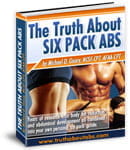Spices are great for keeping hunger at bay. They are known to significantly reduce cravings, so add some heat to your food! If spicy main courses are not really palatable to you, go for a spicy appetizer instead. Sprinkle your soup with some red pepper for a fiery start to your lunch!
6 Terrible Dieting Tips - By Cory Couillard
Let's learn to take the die out of dieting.
Diet and nutritional advice is one of the most common questions that we see in clinical practice. It is apparent that people get continuously misled when it comes to advice to
lose weight, restore health and prevent disease.
The usual culprit of the misinformation is the media, internet, health professionals and most commonly, your neighbor.
Health, wellness, disease prevention and treatment techniques should not be too different. A great example includes weight loss advice.
In many instances one is given advice to lose weight at all cost, even sacrificing one's health to achieve weight loss. Losing weight should not be the objective; it's restoring healthy food and activity to help heal the body.
If you lose weight and forget about the health of the body, you die lighter.
The principles of health and healing always work when you focus on how your body is designed to be healthy. The objective of this article is to expose the terrible advice that is commonly repeated and replace it with a solid foundation of application.
"Carbohydrates are Bad for You"
When people hear "carbohydrates" they think of bread, pasta and rice. These items have a lot of carbohydrates but that is not the culprit that produces disease.
How these products are made and processed is the common culprit. It is true that one should limit the consumption of these products in efforts to reduce diabetes, heart disease and obesity.
Vegetables have carbohydrates, though, too. The myth that "carbs are bad" is not true. The difference is that vegetables do not get processed like a loaf of bread.
The recommendation is to reduce and completely eliminate processed carbohydrates such as breads and pastas and replace them with "better" carbohydrates that were originally designed to be consumed.
No one gets fat from eating too many vegetables, just too much junk food.
"All Calories are the Same--Calories in Equals Calories Out"
A lot of healthcare professionals and popular fitness gurus talk about calories in equals calories out. What are they trying to say?
Regardless of the type of food that you consume, your body will utilize it exactly the same. If you desire to remain the same weight, the amount of calories that you eat should be the amount of calories burned by your body.
If you want to
lose weight, cut down on what you eat and exercise more.
The problem with this concept is that all nutrition is not the same and everyone's body does not burn and utilize the nutrients the same.
Hormones in the body and the negative impact of lifestyle, stress and medications play a significant role in efficiency of
burning calories.
The advice is to eliminate all processed food choices and eat as fresh, raw and organic as possible.
These food choices have been created for consumption and will aid in fueling your body with the right nutrients to balance hormones, reduce chemical food stress and encourage healing in your body.
All exercise is not created equal. High intensity, short duration exercise has been found to be the most efficient form of exercise to encourage healing, build muscle,
burn fat and balance hormones.
Low intensity, long duration exercise such as running and aerobics do not have similar healing properties.
"Don't Eat Fats"
The "eat low-fat" campaigns have created fatter people worldwide. The truth is that fat is a very good and efficient fuel source for your body to operate efficiently.
The problem lies with the type of fat you consume. Processed fats and specifically cooking oils are "bad fats" and they make you fat.
Fats such as coconut, olive and avocado oils have been found to have amazing healing and
weight loss properties.
Trans-fat and saturated fats that are in processed foods have been found to be the culprit in high cholesterol, high blood pressure, diabetes and obesity. You may enjoy these food items, but start saving money now and schedule a visit with your doctor and hospital to treat the conditions associated with consumption.
"Fruit is Good for You, Eat All You Want"
Fruits have a high density of sugar which can throw havoc on your hormones and
weight loss goals.
Many people that try to lose weight attempt to eat fruit exclusively; unfortunately they fail. Implement a balanced diet that is composed of natural carbohydrates (vegetables), fats and protein.
The best fruits to consume are ones that have lower sugar content. These fruits include all berries and granny smith apples. The highest sugar content can be found in bananas and melons and should be avoided.
"Eat Multiples Times Per Day to Lose Weight"
Yes, this can re-activate your
metabolism, but many people do not apply this principle correctly. It is common for an individual to overeat and abuse portion control.
The most important meal of the day is breakfast; do not skip it. This does not mean eat a full breakfast and eat a full chicken for lunch. A serving size of meat is usually the size of your fist.
If you only eat one meal per day, it is common to have weight related issues as well. Your body's hormones and
metabolism will store fat to utilize during the times of not eating.
The most efficient way to lose weight and be healthy is exercise exceptional portion control for three meals per day and eat a snack in between.
"You Can Get into Shape with Diet Alone"
Yes, you can lose weight without exercise but you will become frailer, have a depressed immune system, and become weak and scrawny without exercising.
Losing weight does not mean you're in good shape. The way the world commonly views health is based on your weight. If you are skinny, you think you are healthy.
How many skinny people are sitting back, doing nothing for their health and waiting for a health disaster to happen?
If you focus on artificial weight loss, you sacrifice your health. If you focus on healthier choices and overall lifestyle factors you will lose weight naturally. Starving yourself is a short lived diet.
The most important part of any nutrition, exercise and chiropractic program is consistency. Everyone is different and there is no black or white when it comes to health.
The shades of gray will sometimes become confusing and your health suffers. Find a Maximized Living healthcare professional that will support, encourage and provide an easy to follow action plan for you and your family's healthcare goals.
About the Author:
Cory Couillard has owned two private practices and has been the Chief Operating Officer and Chief Brand Officer for the largest privately owned clinic. He is active in professional development, mass education programs and implementation of healthcare delivery systems.
Cory is currently a professional healthcare speaker and writer for newspapers, magazines, websites and other publications. He is also involved with the development of two international television health programs.
Visit
http://www.maximizedliving.com and "Like" the Facebook page: Maximized Living
-------------------------------------------------------------
*** Healthy Recipe: Braised Kidney Beans & Sweet Potato ***
-------------------------------------------------------------
The combination of spices makes this hearty and nutritious vegetarian meal or side dish unusual. It is an excellent source of vitamins A and C and molybdenum. It is also very easy to prepare and needs minimal attention while cooking. Enjoy!
To read the full recipe,
go here.
 If you're already a reader of my Truth about Six Pack Abs manual,
then you may already know this unique trick... it's basically a simple
exercise that you can do anytime, anywhere to help get a flat stomach
over time.
If you're already a reader of my Truth about Six Pack Abs manual,
then you may already know this unique trick... it's basically a simple
exercise that you can do anytime, anywhere to help get a flat stomach
over time. This idea of "ab vacuums" while driving is just one of the dozens of tips and tricks found inside my Truth about Six Pack Abs manual. If you don't already have a copy, see what other readers are saying about Truth about Abs here
This idea of "ab vacuums" while driving is just one of the dozens of tips and tricks found inside my Truth about Six Pack Abs manual. If you don't already have a copy, see what other readers are saying about Truth about Abs here























